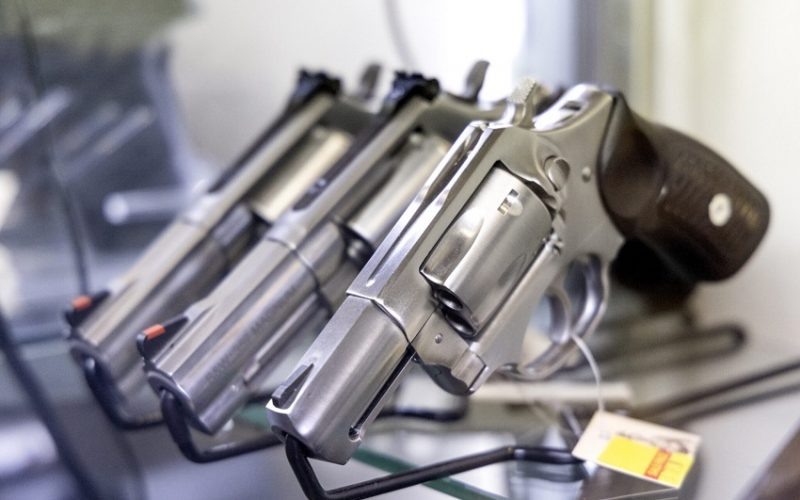Salem, OR – Oregon lawmakers are considering a set of controversial gun control bills in the midst of ongoing legal battles over Measure 114, a voter-approved initiative that aims to tighten gun regulations in the state. The proposed bills would introduce new restrictions on gun purchases and ownership, escalating the debate over how best to balance public safety with Second Amendment rights.
The three key bills, each of which advanced along party-line votes, include measures to increase gun permit fees, codify restrictions on high-capacity magazines, introduce a mandatory waiting period for gun purchases, and ban devices that enable faster firing of guns. Supporters of these bills argue that they are necessary to curb the rising gun death rate in Oregon, which saw a 31% increase in firearm fatalities between 2013 and 2022. Additionally, firearms have become the fifth leading cause of death among children and teens aged 1 to 17 in the state, according to data from Johns Hopkins University.
The proposed legislation comes as Oregon’s firearm death rate remains near the national average, and higher than that of neighboring states like California and Washington. Advocates for stricter regulations, including Democrats in the state legislature, emphasize the importance of public safety in the face of these troubling trends.
“Every session since I’ve been here we’ve had at least one gun bill, and it never seems to be enough for this body,” said Rep. Rick Lewis (R-Silverton), a vocal critic of the proposed measures. Lewis and other Republicans argue that Oregon has already enacted a series of gun laws in recent years, including measures to ban untraceable 3-D printed guns, require secure firearm storage, and allow courts to temporarily remove firearms from individuals deemed a threat to themselves or others.
Despite the controversy, some Democrats continue to push for more comprehensive reforms. House Bill 3075, sponsored by Rep. Jason Kropf (D-Bend), aims to codify Measure 114’s ban on high-capacity magazines, increasing the maximum fees for gun permits and introducing a 180-day grace period for individuals to dispose of any magazines holding 10 or more rounds. The bill would also close what’s known as the “Charleston loophole,” a reference to the 2015 shooting at a South Carolina church where a background check on the shooter was not completed in time, allowing him to buy a firearm. If passed, the bill would ensure background checks are completed before gun permits are issued.
“We’re making sure that only people who are safe with firearms can possess them,” Kropf said during an April 8 committee vote on the bill.
The proposed legislation also requires gun owners to have completed a safety course within the last five years, a provision that has drawn criticism from groups such as the Oregon Hunters Association, which argues that it unfairly burdens long-time gun owners who already have years of responsible firearm use under their belt.
Another key bill, House Bill 3076, also sponsored by Kropf, seeks to establish a state-level licensing system for gun dealers. Currently, firearms dealers are licensed by the federal Bureau of Alcohol, Tobacco, Firearms, and Explosives (ATF), but this new legislation would create an additional layer of oversight, which proponents argue is necessary to address gun trafficking and improve safety standards. A 2024 study from the Alliance for a Safe Oregon found that a significant number of guns used in crimes in the state were purchased from licensed dealers, yet many of these dealers are rarely inspected by federal authorities.
However, gun rights groups oppose this proposal, claiming it imposes unnecessary regulations and additional costs on law-abiding citizens. “These bills force additional, expensive regulations on law-abiding citizens that many of them cannot afford,” said Rep. Greg Smith (R-Heppner).
The third major proposal, Senate Bill 243, would impose a mandatory 72-hour waiting period for gun purchases, aiming to reduce impulsive buying, which has been linked to higher rates of gun suicides and mass shootings. This measure would align Oregon with 10 other states that have similar waiting periods. Additionally, the bill would ban rapid-fire activators—devices that enable semi-automatic weapons to fire more quickly, such as the one used in the 2017 Las Vegas shooting, which left 60 people dead.
Supporters of the bill argue that a waiting period would prevent impulsive gun purchases, particularly in situations involving people experiencing emotional distress or mental health crises. “Oregon has a high firearm suicide rate, and a significant portion of those deaths are impulsive,” said Jess Marks, executive director of the Alliance for a Safe Oregon. “A waiting period could save lives.”
Opponents, including many gun rights advocates, argue that the waiting period constitutes an unnecessary delay for law-abiding citizens exercising their constitutional right to bear arms. The National Rifle Association’s Institute for Legislative Action has also expressed concerns about potential logistical challenges for gun dealers and buyers, suggesting that the waiting period could disrupt business operations.
The future of these bills remains uncertain. Measure 114, which would introduce some of these measures, has been temporarily blocked by a Harney County judge who ruled it violated the Oregon Constitution’s right to bear arms. However, the Oregon Court of Appeals recently overturned that decision, and the case is now before the Oregon Supreme Court, which will determine whether the law can take effect.
As Oregon grapples with its gun control debate, the proposed legislation is a flashpoint for broader national conversations on gun violence, public safety, and the limits of Second Amendment protections. While some argue that further regulation is necessary to protect communities, others remain committed to preserving gun ownership rights without additional governmental interference.











